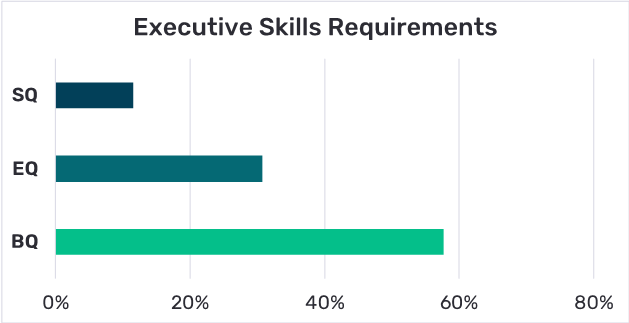
The most sought-after people in 21st-century organisations will be those known for their ability to move organisations forward and manage themselves and others effectively through their expert, ethical, and trustworthy approach to business. This combination of skills and competencies is the Advancing Women Formula.
The advancing women formula = BQ + EQ + SQ
The ingredients of this secret sauce for leadership and career success for women are as follows:
- BQ: Business intelligence in leadership refers to the leader who gets results and rests on the competencies associated with business, strategic, and financial acumen and success orientation. These leaders know and are known for their skills in leading for outcomes that will contribute to the business meeting its strategic and financial goals.
- EQ: Emotional intelligence in leadership is the ability of leaders to lead themselves, others, and organisations. As the workplace becomes increasingly complex and interconnected, emotionally intelligent leaders will build trust and rapport with others, inspire their teams, resolve conflicts, handle stress and pressure, make sound decisions, and adapt to constantly changing circumstances.
- SQ: Social intelligence in leadership is the leader who uses a wide range of competencies, including BQ and EQ, with confidence, credibility and courage to develop strategic relationships and build their professional brand. Leaders with social intelligence are respected and trusted by their peers because of their ethical approach and ability to negotiate and influence others.
However, when it comes to closing the leadership gender gap, there is a glaring omission, not in this leadership formula but in how a crucial component often remains overlooked, particularly in development experiences for women in the workplace.
BQ is the missing link
BQ is frequently the missing link in programs designed to advance women to higher leadership positions and increase their organisational effectiveness. Why? Because most training designed for women neglects to emphasise the importance of BQ for advancement to senior leadership roles in organisations.
Sixty per cent of the skills criteria for senior roles focus on business intelligence skills, so organisational training must mirror that. Yet only some career development resources targeted at women overtly address this crucial area.

This lack of emphasis on BQ leads to women not understanding the importance of BQ early enough. It also contributes to the perception that men are good at BQ, and women are good at EQ.

When I ask women in my leadership development programs, workshops, and speaking engagements: “What is the best career advice you have ever received?” An overwhelming 96 to 98 per cent of women reported receiving advice or development opportunities that did not touch upon enhancing their business intelligence.

This gap in leadership development programs hinders women’s career progression and impacts organisational success. Effective leadership, capable of driving businesses forward, requires emphasising BQ skills that are enhanced by EQ and SQ skills. With it, the leadership equation is complete.
Stop training women to be confident
Historically, resources and training aimed at women have disproportionately focused on boosting confidence, assertiveness, and self-advocacy. While these elements cannot be ignored, they alone do not fully equip women to advance to the top echelons of leadership that demand a robust understanding of business operations and financial and organisational strategy.
Addressing this imbalance is not merely about fairness or diversity; it’s a strategic imperative for organisations aiming to outperform in a highly competitive marketplace. Ensuring women have access to comprehensive development that includes BQ can unlock a reservoir of untapped potential, fostering more diverse leadership that is best equipped to navigate the complexities of business.
HR leaders are pivotal to closing the BQ gap
HR leaders play a pivotal role in this transformation. By advocating for and implementing more holistic leadership development programs that prioritise women’s development and demonstration of their BQ skills, they can significantly influence the acceleration of the leadership gender gap closing and increase the number of women in the group talent pool ready to lead at higher levels in the organisation.
- Implement targeted leadership development programs for women: Advocate for and establish comprehensive leadership development initiatives prioritising business intelligence (BQ), ensuring women leaders are fully equipped for senior roles.
- Audit the BQ gap: Conduct a thorough review of existing training and development offerings for women to identify and fill gaps in business intelligence education.
- Equitable training and development: Ensure women have equitable opportunities to develop and demonstrate BQ skills to talent decision-makers.
- Track progress and accountability: Establish clear metrics and benchmarks for measuring the success of leadership development programs, particularly those aimed at advancing women, and hold leaders accountable for making tangible progress toward closing the leadership gender gap.
This means HR Leaders must commission the design of an equitable talent management strategy that includes a formal focus on talent and career management pathways for women. By doing this, HR acknowledges and deals with the missing link for women and ensures the organisation closes its leadership gender gap.
Michelle Redfern is a diversity, equity and inclusion leader.
RELATED TERMS
Talent management is the process of anticipating the human resources that a company will need and making plans to fill such gaps.
Training is the process of enhancing a worker's knowledge and abilities to do a certain profession. It aims to enhance trainees' work behaviour and performance on the job.
Jack Campbell
Jack is the editor at HR Leader.










